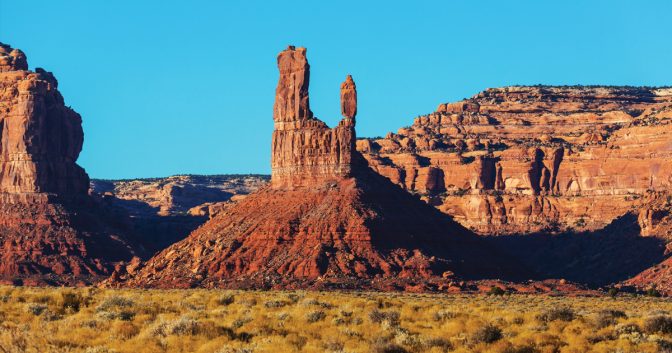Hemp-Friendly Patagonia Sues Feds Over Utah Land Grab

On Dec. 4, in an unprecedented repudiation of Theodore Roosevelt’s 1906 Antiquities Act, Pres. Donald Trump, at the behest of Utah lawmakers and energy and mineral interests, slashed the sizes of two national monuments in the state’s wild southeast corner, reducing Bears Ears by 85% and Grand Staircase-Escalante by 47%.
In immediate response, Ventura, Calif.-based outdoor retailer Patagonia, founded in 1973 by former accredited rock climber Yvon Chouinard, and several other groups banded together to sue the Trump administration.
“Utah lawmakers have always been hostile toward tribes,” says Natasha Hale, lead staffer of the Bears Ears Intertribal Coalition, who Patagonia has made contributions to via the Conservation Lands Foundation. “They’re completely disrespectful. And it’s been pretty evident in this campaign that they totally disrespect Natives. It’s an institutional racism and an outright blatant racism. There’s a denial that we have any type of say in our landscape.”
San Juan County, home to Bears Ears and Rainbow Bridge National Monument, is a rare place. Native Americans, including Pueblos and Navahos, outnumber white residents by 50% to 46%. It has some of the most stunning and fragile landscapes in the world, dotted with ancient dwellings, relics and petroglyphs. However, beneath the soil lies a multitude of extractable materials, which is at the root of this controversy.
Patagonia, which trains athletes and tests products at Bears Ears, has an long history of environmental activism. The company is a California benefit corporation, meaning it’s legally obligated to give 1% of its annual net revenue to nonprofit organizations that promote environmental conservation and sustainability. It’s pledged $74 million since 1985.
The Historic Beauty of Bears Ears
Many of the groups Patagonia has supported protect wild places in their local communities, including through national monument designation. The creation of Bears Ears was a direct result of Patagonia’s efforts.
President Barack Obama designated Bears Ears as a national monument shortly before he left office, on Dec. 28, 2016, after consulting local stakeholders, including San Juan County officials and tribal leadership. The designation protects Native American sites from vandals, theft and looting; preserves the delicate landscape; and makes extraction industry activities more difficult.
Obama was well within his rights to create Bears Ears. The Antiquities Act states that the President is authorized to designate historic landmarks, structures and “other objects of historic or scientific interest.” While it also says that the monuments “shall be confined to the smallest area compatible with proper care and management of the objects to be protected,” that standard has proven to be very subjective.
“We wanted to protect, as tribes, 1.9 million acres,” says Hale. They compromised on 1.3 million acres, which left the Daneros Uranium Mine outside the boundary for Bears Ears. Colorado-based Energy Fuel Resources, owners of Daneros, recently lobbied the Trump administration to have the monument shrunk.
Patagonia to the Rescue

The Moon Tower in Utah’s Valley of the Gods (photo by Josh Ewing)
The Patagonia lawsuit asserts that the company will suffer “direct and immediate injury from the revocation of the designation of the landmarks, structures and objects of the Bears Ears National Monument.” “The Administration’s unlawful actions betray our shared responsibility to protect iconic places for future generations and represent the largest elimination of protected land in American history,” Patagonia president and CEO Rose Marcario stated.
The company says that “removing protections for federal lands could result in permanent destruction of these treasured places,” and cites polls showing that 67% of Americans think that public lands should be protected.
Several Utah lawmakers called the designation a federal land grab, despite the fact that 66.5% of the state’s land is owned by the federal government. At the heart of the conflict is what many Western interest groups see as federal overreach; they’ve been smarting since President Bill Clinton’s designation of Grand Staircase-Escalante in 1996.
The Nevada-based Bundy family has been the most publicly extreme example of this, but they’re not without support among Utah politicians. In 2014, they joined current San Juan County Commissioner Phil Lyman in an all-terrain vehicle joyride up Recapture Canyon in Blanding. Lyman spent 10 days in jail and received three years probation for the stunt. Cliven Bundy, the family patriarch, later forced an armed standoff with federal authorities in Nevada over millions of dollars in unpaid grazing fees, and in 2016, his sons Ryan and Ammon illegally seized and ransacked the Malheur National Wildlife Refuge in Oregon.
Some see Patagonia as a puffy-jacketed liberal interloper whose sole desire is to leverage the lawsuit for marketing purposes and to usurp Western land interests. But Patagonia has demonstrated loyalty to Utah by anchoring the Outdoor Retailer Sports Expo and Conference in Salt Lake City, which brings outdoor retailers like REI and Black Diamond to the state, along with millions of dollars. That relationship soured when Patagonia caught wind of a scheme between Utah lawmakers and the Trump administration in early 2017.
Federal Overreach Led by Zinke and Hatch
Sen. Orrin Hatch, Rep. Rob Bishop and Gov. Gary Herbert saw an ally in Secretary of Interior Ryan Zinke, and began plans to sue the U.S. government to shrink Bears Ears. Zinke has shown strong allegiance to ranching, oil, gas and mining interests looking to increase their exploitation of federal lands.
“Governor Gary Herbert and his buddies have spent years denigrating our public lands, the backbone of our business, and trying to sell them off to the highest bidder,” Chouinard wrote on the company’s website. “He’s created a hostile environment that puts our industry at risk. He should stop his efforts to transfer public lands to the state, which would spell disaster for Utah’s economy.”
Despite the fact that Utah’s outdoor industry employs more than 120,000 people and brings $12 billion to the state each year, far surpassing the output of extraction and ranching interests, Herbert was unswayed. This resulted in Patagonia withdrawing from the recent Outdoor Retailer Sports Expo, which then decided to move moved to Denver.
The Trump administration argues that national-monument designations violate the intent of the Antiquities Act, contending that they’re too large. It also contends the land must be mined for national security, to break American reliance on foreign sources for critical minerals and create energy independence. However, 90% of public lands are already available for oil and gas development; there are more than 7,500 drilling permits covering more than 19 million acres of unused public land leases.
RELATED: Gauging the Trump Effect on Congress and the DOJ
Zinke and Trump are not stopping at Bears Ears and Grand Staircase. Also in their crosshairs is Nevada’s Gold Butte National Monument, another recipient of Patagonia’s environmental patronage.
“There’s been this power among the shared interests of Patagonia and the tribe,” says Hale, who believes that Patagonia’s involvement has raised the profile of their work and inspired environmental and land-use awareness among other outdoor retailers. “It’s been exciting to see the tribes and Patagonia come out so strong.”
Gavin Noyes, executive director of Utah Diné Bikéyah, a Native American-run nonprofit that supports indigenous communities in preserving their heritage and is a co-complainant on the lawsuit, says it’s business as usual while the saga unfolds. “I feel optimistic that we will prevail in the lawsuit,” he declares. “The president doesn’t have the authority to shrink monuments.”
Sidebar: Patagonia’s Hemp Line

Patagonia mixes organic cotton and recycled polyester with hemp.
Patagonia has 22 items with hemp in its catalog, including shirts, T-shirts, tops, pants, shorts and coats (from $39-$149 at patagonia.com/shop/hemp-clothing).
“Though our hemp is not ‘certified organic,’ it’s grown organically using all natural ingredients: compost, animal manure and available rainfall,” its website explains. “Patagonia makes garments with 100% hemp or blends it with other fibers like recycled polyester, organic cotton and spandex… We currently import our high-quality hemp fabric from China and continue to hope this remarkably useful plant will one day grow without restrictions again.»

